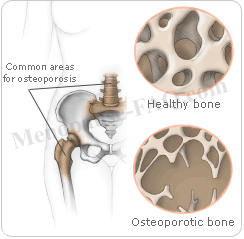 |
 |
|
|
| |
|
| |
|
 |
|
 |
|
 |
|
 |
|
| |
|
| |
|
| |
|
 |
|
 |
Does Bone Mineral Density Change During Postmenopause? |
|
|
|
Studies have shown BMD starts to minimize in women during perimenopause. A research study was conducted in the Department of Medicine in the Massachusetts Hospital in Boston, to see if ethnicity played a roll in postmenopausal BMD in women. Research was done on 3 ethnic groups in the U.S. These were Caucasian, Chinese, Japanese and African-American. |
|
Closing reports concluded that the groups with the highest BMD were African-American. Second was Caucasian and third were Asians. Yet, studies brought on that Asian women had minimal fracture rates than Caucasian women even thought their bone density was less. This could be due to the different lifestyles such as diet and careers. Women around the perimenopausal ages of 42 years were studied during perimenopause and during postmenopause for this study. Another study was done to see if weight played a valid role, and women below 70kg from various ethnic groups were tested. There showed to be no significant difference in BMD in African-Americans and Asians. Caucasians showed to be the lowest in these tests despite weight. |
 |
|
Caucasian women have shown to be the most liable to having a decreased BMD during menopause and postmenopause. Even thought their BMD is shown to be higher than Asians, their BMD was more fragile and they suffered from more bone fractures.
Further tests taken have shown weight factors to affect BMD in women undergoing menopause. Ethnic groups BMD do differ, but lifestyle and dietary differences are shown to play a benevolent role in the regulation of BMD during menopause. Weight gain factors that are coherent to an ethnicity�s biological make up could be associated to a decreased BMD in women in postmenopause. Research has revealed that the Caucasian population in the U.S is the largest group to suffer from obesity. This could also be a contributing factor in women suffering from weak BMD.
Source: PUBMED.GOV. �Bone Mineral Density Changes During the Menopause Transition in A Multi-Ethnic Cohort of Women.�. Finkelstein J.S & Brockwell S.E. 6 December 2007.
|
|
|
| ©Copyright 2008. Postmenopause. All rights reserved. |
| Providing information on: Menopause Stages, Premenopause, Perimenopause, Menopause, Postmenopause. |